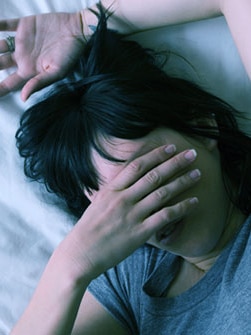We’ve all seen it in high-definition close-up on TV: a football player lining up to take the shot of their life with heavy bags under their eyes.
It’s the moment they have dreamt of for their entire career but chances are they didn’t dream at all the previous night because they hardly slept.
According to a Flinders University study, there is a prevalence in sleep disorders among athletes and, for many, it continues after they retire.
“Whether they’re getting up early for a training schedule consistently, or have training sessions late into the evening, that can affect their sleep,” lead investigator and PhD candidate Ashley Montero said.
Some Port Adelaide players may have endured a sleepless night ahead of tonight’s do or die semi-final. (Getty Images: Michael Willson)
It was also common for athletes to be lying in bed thinking about performing the following day, or ruminating on past performances, especially those who had recently retired and had not fully “adjusted to life after sport”.
“Night-time can be quite bad for a lot of that,” Mr Montero said.
“Some of them had nightmares about poor experiences during their sporting time.”
Lying awake for hours
Australian Paralympian Anu Francis, who recently came fourth in the triathlon in Paris, said she could lie awake for hours thinking about the race day ahead, “often resulting in only four to five hours of sleep”.
Adelaide’s Anu Francis came fourth in the Para-triathlon in Paris. (Instagram: @anu_francis)
“Normally once I fall asleep, I do stay asleep. However, before my race in Paris, I woke up three to four times during the night with strange dreams about the race, resulting in even less sleep,” she said.
A 2022 Australian Institute of Sport (AIS) mental health audit found 39.2 per cent of participating high-performance athletes reported mild sleep disturbances and 28.3 per cent moderate to severe levels.
AIS mental lead Nicole Burattin said sleep issues could be a symptom of poor mental health “and, conversely, sleep issues can impact mental health”.
She said poor sleep could impact “not only on their wellbeing but also their performance in sport, including increasing their risk to injury or decreased reaction time”.
High-performance athletes are offered support through the AIS rest hub, which, for athletes competing in Paris, was part of their preparation.
Reducing anxiety
Francis, who was not part of the Flinders study, said she sometimes used a sleeping tablet the night before a big race but did not consider it an “ideal solution”.
But she added she tried not to worry too much about the night before a race.
“This is because, firstly, this night is often hard to control with being in an unfamiliar environment with lots to organise plus the nerves of racing the next day,” Francis said.
“Secondly, I trust that my chronic sleep patterns, particularly my sleep from the week prior to race day, are far more impactful on my race day performance than the night before.
“This mindset and perspective helps reduce the anxiety and pressure about how I sleep the night before, which in turn helps me sleep better.”
Francis said training regimes, however, had a lasting impact on sleep consistency, particularly when three days a week her alarm for training was going off at 4:45am.
Anu Francis trained in Switzerland ahead of the Paris 2024 Paralympics. (Instagram: @anu_francis)
“If I’m aiming for eight hours of sleep, I’d need to be asleep by 8:45pm, which is rarely achievable for me with other work, life, and training commitments,” she said.
She often took 20-minute afternoon naps to help overcome fatigue and added that ear plugs, noise-cancelling headphones, and an eye mask were important for travelling and competing.
“I wouldn’t have survived in the Paralympic Village without my earplugs. It’s so loud at night,” Francis said.
Athletes fear privacy breaches
Nearly 1,000 athletes from seven different countries were surveyed for the Flinders study, which was published in the Australian Psychologist journal.
Mr Montero said athletes from about 37 different sports participated.
He said many were hesitant to seek help from within their sport’s hierarchy due to fears their privacy would be breached by a team doctor and the “stigma” attached to mental health.
This led to anxiety about how a coach and peers might perceive them, potentially impacting their selection in a team, so they tended to seek help from external resources — if at all.
Mr Montero warned that if they were having sleep issues as an athlete and it was not diagnosed and treated, then some of those “poor habits that athletes tended to develop could carry over into retirement too”.
“This highlights that retired athletes still face mental health challenges and that sports organisations should provide support even after athletes retire,” he said.
Mr Montero said there was growing support for the mental health and sleep habits of competing athletes from the likes of the AIS and a lot of that filtered down from the elite level to semi-professional and amateur.
“But if they haven’t been linked into a good support system that carries over to retirement they’re left to face of lot of those issues untreated.”
FHMRI at Flinders conducts a range of research into sleep disorders. (Supplied: Flinders University)
Ms Burattin said the AIS Mental Health Referral Network (MHRN) connected athletes with professionals to help them with issues like stress, anxiety, depression, and transition out of sport.
She said athletes continued to have access to the MHRN after retirement.
“Retirement and transition out of sport can be a challenging time for athletes as they adjust to this significant change,” Ms Burattin said.
“Social and mental health support can act as a protective factor for athletes during their retirement.”
The Flinders study found female athletes reported more mental health disorders than men, including high rates of anxiety, depression, and eating disorders.
It further found that athletes with both sleep and mental health problems struggled more in everyday life than those with just one of those issues.




